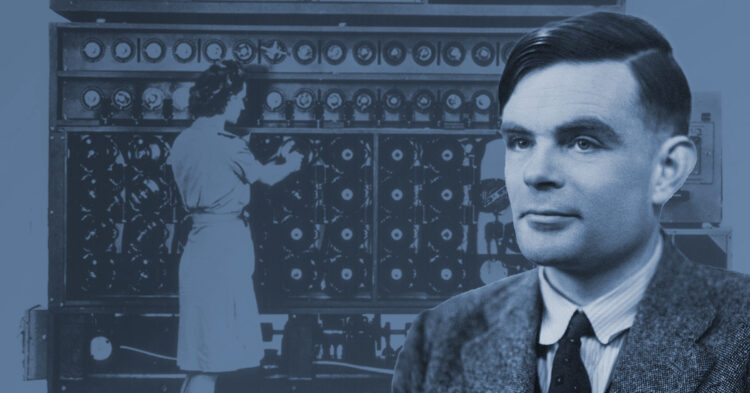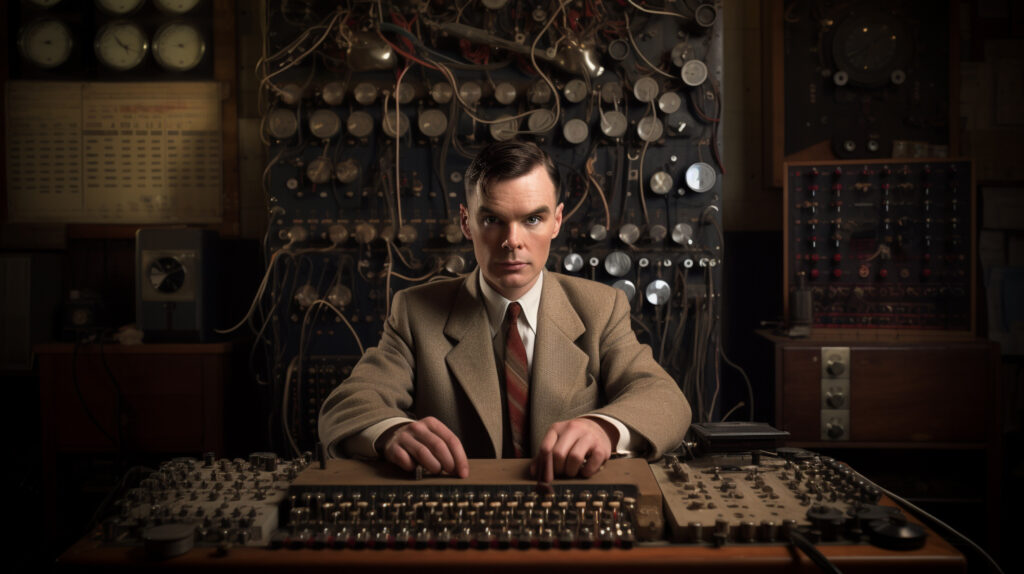
Masterframe Trade
Alan Turing – A hero we must never forget
Alan Turing – A mastermind that literally saved thousands of lives in WW2 – a hero we must never forget.
I am sure that the reality of this genius is that very few people really new Alan Turing until the release of the film The Imitation Game in 2014 however he and his colleagues were instrumental in saving thousands if not millions of lives in WW2.
Alan Turing was a brilliant mathematician, born in London in 1912 he studied at both Cambridge and Princeton Universities. In 1938 after receiving his Ph.D from Princeton he returned to Cambridge and took a part-time job with the government code and cypher school, a British code breaking organization. Upon declaration of War on 3rd September, 1939 Turing took up a position at the wartime cryptanalytic headquarters at Bletchley Park. One of their ideas was embodied in a machine called a Bombe. From the late 1940’s Turing-Welchman Bombe made reading of the Lufwaffe’s signals routine. In contrast the more complex Enigma methods used in German Navel communiations were generally regarded as unbreakable. Turing happy to work alone on a project that seemed unbeatable he cracked the code at the end of 1939 but it required capture of further material by the Navy and the development of sophisticated statistical processes before regular decryption could begin in 1941.
Turing crossed the Atlantic in November 1942, for highest-level liaison not only on the desperate U-boat Enigma crisis, but on the electronic encipherment of speech signals between Roosevelt and Churchill. Before his return in March 1943, logical weaknesses in the changed U-boat system had been brilliantly detected, and U-boat Enigma decryption was effectively restored for the rest of the war. With the battle of the Atlantic regained for the Allies, crisis resolved, chess champion C. H. O’D. Alexander, hitherto Turing’s deputy, took charge of Hut 8 at Bletchley Park.
Turing became an all-purpose consultant to the by now vast Bletchley Park operation.
In 1949, Turing became the deputy director of the Computing Laboratory at the University of Manchester where he focused on the software needed to drive the Manchester Mark 1 stored program computer. In 1950, he published a paper entitled Computing Machinery and Intelligence, in which he explored the notion of artificial intelligence, he really was ahead of his time a genius.
Turing was elected a fellow of the Royal Society of London in March 1951, a high honour, yet his life was to become so very difficult. In March 1952 he was convicted of “gross indecency”—that is to say, homosexuality, a crime in Britain at that time—and he was sentenced to 12 months of hormone “therapy.” Having now received a criminal record, he would never again be able to work for Government Communications Headquarters (GCHQ), the British government’s postwar code-breaking centre.
Turing was to spend the rest of his very short career at Manchester, where he was appointed to a specially created readership in the theory of computing in May 1953.
Turing died on 7th June 1954 the cause of death was cyanide poisoning given the treatment he received after spending the whole of his life working on a project that would change the course of the war and save literally millions of lives is it any wonder he felt that the world has turned his back on him and what was the point of living.
Thankfully in 2009 the British Prime Minister Gordon Brown speaking for on behalf of the government publicly apologized for Turing’s “utterly unfair” treatment. Four years later Queen Elizabeth II granted Turing a royal pardon.
Turing was unique and changed the course of history, his story although in the end heart-breaking is one we should all know and understand as his absolutely amazing mind paved the way for not only helping to end the war quicker but the evolution of the computer that globally we could not do with out today. Today is about remembrance and Alan Turing in my opinion is a hero that we owe such a debt of gratitude to and a man we should always remember and honour.





